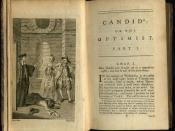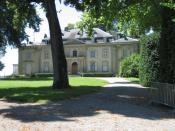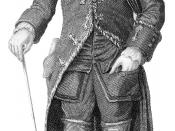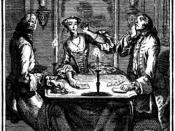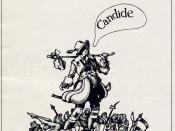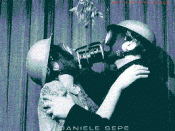In VoltaireÃÂs Candide, women play a very significant role. Cunegonde is the woman in who inspired the travels and experiences of Candide. The book begins when Candide, a young boy, falls in love with Cunegonde then gets kicked out of the castle, which is the beginning of his travels. Candide travels the world and faces death on several occasions for CunegondeÃÂs hand in marriage. Women have more control and power than is acknowledged. There are several occasions where CunegondeÃÂs power is overlooked, but she shaped the destiny of more than one man. Throughout the novel, Candide's warped perception of true love leads him to believe that marriage to Cunegonde could be more perfect than heaven itself.
Cunegonde was captured by the Captain of the Bulgars after they took over her castle. After the Captain lost his money, he sold her to Don Issachar who was a trader in Holland and Portugal.
While in mass she caught the attention of another man who was The Grand Inquisitor. Immediately he wanted her for himself, therefore he asked Don Issachar to cede her to him. After a long debate, finally the two men came to an agreement through intimidation. Through this small rivalry, it is most commonly viewed that Cunegonde is being treated as a piece of property. However, this is one of the most beautiful and valuable pieces of property to these two men because it is worth fighting for. Cunegonde treated her body as a temple and resisted both of these two men which only made them fall deeper in love with her. This gave Cunegonde even more power to have the ball in her favor, because the men were not in their right frame of mind and let love blind their decisions.
Candide had already been in love with Cunegonde and traveled the world in search for her hand in marriage. Once Candide found her he killed to have her to himself. Don Issachar walked in to retrieve Cunegonde and was enraged at the sight of her with Candide. Candide then killed Don Issachar with a dagger. The power Cunegonde had on Candide forced him to kill another time, when The Inquisitor walked into his own home. Candide killed The Inquisitor for fear of himself being killed, for doing all of the wrong actions that he had previously done. If he did not kill The Inquisitor, then he would have gotten caught and all of his killings would have been pointless.
Cunegonde was passed around from suitor to suitor, but every time they fell in love with her beauty, it became their downfall and poison. In the end Candide did finally get his lovely Cunegonde and they lived happily together. The power of love is sometimes looked over and seen as a weakness, but it can move mountains and drive people to do things completely out of character for them because it is no longer in their power. From the beginning of romance, man has been fascinated by women to the point where their beauty eclipses all rational thought. Lust and desire replace his normal routine and his new love becomes the world and stars. Candide is willing to give up all his wealth to acquire a beautiful woman and it does not seem to matter if he 'lost a hundred sheep,' since he is 'now going to fly to the arms of [his] charming Miss Cunegonde (Voltaire, Candide p.73).' Candide is powerless when it concerns his mistress Cunegonde. He is 'with the greatest submission, prepared to obey the commands of his fair mistress; and though he [is] still filled with amazement, though his voice was low and tremulous, though his back pained him, yet he gave her a most ingenuous account of everything that had befallen him (Voltaire, Candide p.33).'Men are vulnerable to the beauty of woman and men receive punishment for their fantasies of wanting to be with only attractive women. The power that Cunegonde possesses over Candide is remarkable. Although she may be viewed as the damsel in distress and is treated poorly at times, throughout the novel, Cunegonde had impeccable control over Candide. Although in the beginning of their relationship, the infatuation began with her astounding beauty, when all of her beauty was lost she still remained in control.
Works CitedDavis, Harrison, Johnson, Smith, Crawford, ÃÂCandide or OptimismÃÂ The Bedford Anthology of World Literature. Francois-Marie Arouet de Voltaire. Boston, New York. Bedford/ St. MartinÃÂs. 2003. 275-338
